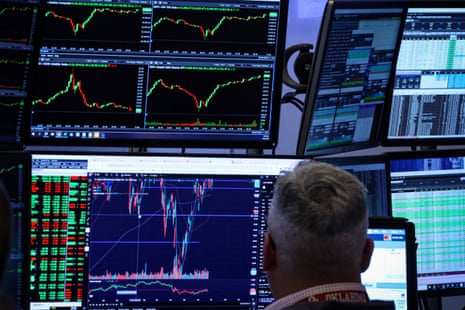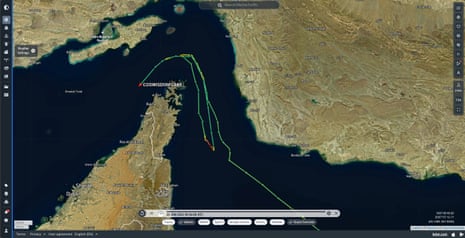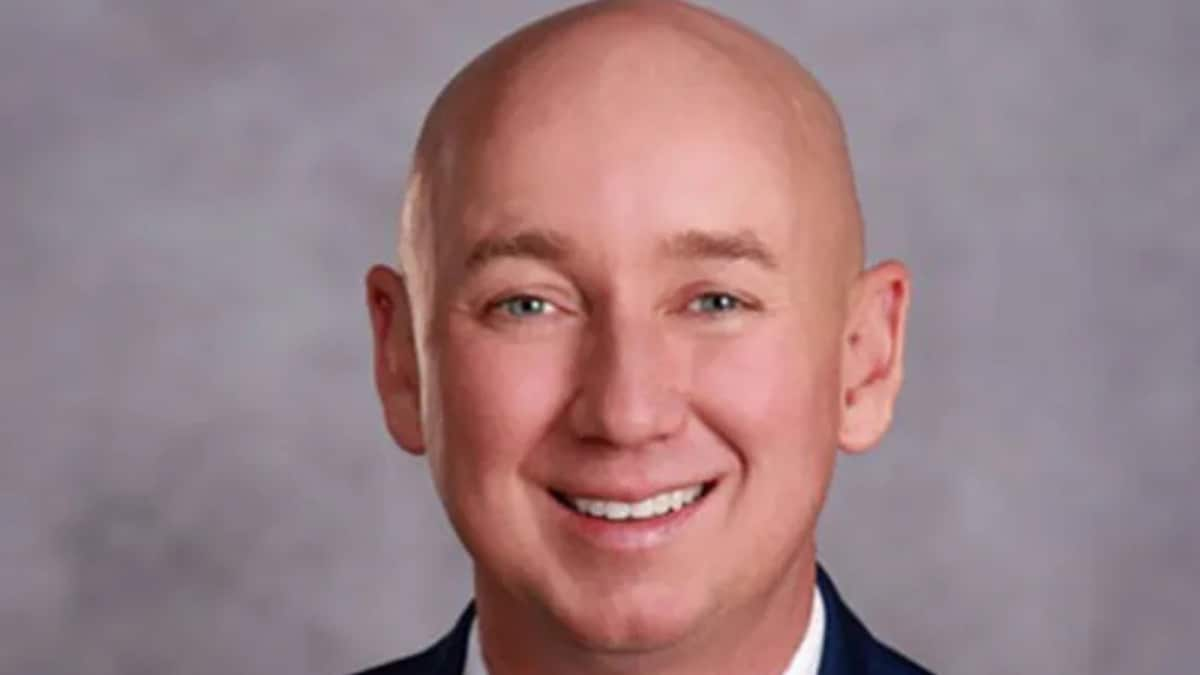Andrew Bailey: Trump trade wars are creating unpredictability
The governor of the Bank of England has warned that Donald Trump’s trade wars are making the UK economy outlook very hard to predict.
Testifying to the House of Lords Economic Affairs Committee, Andrew Bailey explains that the situation on trade and tariffs means the Bank is facing an ‘unpredictable’ situation.
Bailey explains that the Bank doesn’t know how the trade war will play out, as we approach the 9 July deadline set by the US president for other countries to agree trade deals, before higher tariffs are imposed.
Bailey says:
“It is very unpredictable where this is all going to end up. Clearly we are coming towards the end of the 90-day period that president Trump set out for reaching agreements.
We have one agreement so far, which is with the UK. That obviously isn’t implemented yet. That’s it at the moment.
So quite where this is going to go to, I’m afraid we don’t know at this stage.”
Bailey also warns that trade war disruption will hurt economic growth.
“Fragmenting the world economy is bad for activity and bad for growth in the world economy.
“Without as much trade it’s bad for spreading innovation, for instance”.
And he adds that the effect of tariffs on inflation is “more ambigious”. If it leads to exports from China to be redirected to the UK, rather than to the US, it could have a negative impact on inflation.
But if tariffs they disrupt supply chains, they could have an upward impact on inflation.
Key events Show key events only Please turn on JavaScript to use this feature
Closing post
Time to recap.
Central bankers have given an insight into the challenges of controlling inflation in a world of uncertainty.
Bank of England governor Andrew Bailey has warned that the BoE has no idea how Donald Trump’s trade war will play out.
He told the House of Lords Economic Affairs committee that:
“It is very unpredictable where this is all going to end up. Clearly we are coming towards the end of the 90-day period that president Trump set out for reaching agreements.
We have one agreement so far, which is with the UK. That obviously isn’t implemented yet. That’s it at the moment.
So quite where this is going to go to, I’m afraid we don’t know at this stage.”
Bailey also revealed he was surprised that the oil price tumbled yesterday after Iran launched its attack on Qatar, in retaliation for the US bombing of its nuclear facilities.
His compatriate across the Atlantic, Jerome Powell, is also facing the consequences of the Trump tariffs.
Powell told Congress today that the Federal Reserve is in a goood position to “wait to learn more about the likely course of the economy” before considering rate cuts.
Federal Reserve Chair Jerome Powell used his written statement for the first of his two Congressional testimonies to implicitly push back against the two Fed officials who argued for a “live” July meeting. Powell remains comfortable with a policy wait-and-see approach, signaling…
— Mohamed A. El-Erian (@elerianm) June 24, 2025That defies Donald Trump’s demand for cuts to US interest rates – earlier today, he claimed Powell was incompetent for not having lowered borrowing costs already.
Trump also cheered the markets today, by announcing a ceasefire between Iran and Israel and then blasting both sides for violating the agreement.
The oil price has slumped by 5% today, pulling Brent crude down below $68 per barrel, its lowest level since the Iran-Israel trade war.
A chart showing the oil priceEuropean markets rallied, with Germany’s DAX up 1.6% and France’s CAC gaining 1%, although London’s market was pulled back by oil companies.
In other news…..
Business secretary Jonathan Reynolds has put new restrictions on steel imports into the UK in response to concerns over a flood of steel diverted from the US.
Reynolds also insisted he was fighting to get Donald Trump’s tariff on steel imports from the UK eliminated
UK grocery inflation has jumped to its highest level since February 2024
Amazon has confirmed plans to build four new distribution centres, two new head office buildings and “upgrade and expand” its existing network of over 100 buildings across the UK
The Co-op is to stop sourcing goods from Israel, Iran and 15 other countries where it says there are “internationally recognised” rights abuses and violations of international law.
UK farmers seek judicial review over inheritance tax changes

Joanna Partridge
A small group of farmers is seeking a judicial review over the government’s planned changes to inheritance tax, arguing a public consultation should have been held before the policy change was announced.
The claim was served to the chancellor, Rachel Reeves, and HMRC on Monday. The claimants allege that the government failed to comply with its commitments to consult over significant changes to tax policy.
Rachel Reeves caused uproar and dismay among much of the farming sector last October when she announced plans in her budget to bring farms and other agricultural property into inheritance rules, which she said would raise money for public services and close a tax loophole exploited by some wealthy people who buy up land.
She thereby ended a decades-long exemption for farms via agricultural property relief (APR) and business property relief (BPR). Reeves said inheritors would pay 20% of the value of agricultural property and business property above £1m from April 2026. The plans have sparked large-scale protests in recent months, seen farmers and their tractors descend on Westminster, and led to ministers’ speeches being drowned out by tractor horns.
The claimants are seeking permission from the High Court to challenge Reeves’s decision to hold only a technical consultation rather than a wider consultation exercise which would have sought contributions from those affected.
“The claimants say they are confident that the court will give their application a fair hearing,” said James Austen, a partner at Collyer Bristow, the law firm which has brought the challenge.
He added
“This claim does not seek to overturn the government’s decision to amend APR or BPR but asks that affected individuals and groups can contribute to a proper consultation exercise to ensure the government has the best possible evidence when developing its tax policy for UK farms and businesses.”
Judicial reviews over tax policy are very rare, however this application is the second within a space of months. A group of families and private schools had sought a judicial review over the government’s decision to add VAT to private school fees, but this challenge was dismissed by the high court.
FTSE 100 closes up nearly a point (!)
After a volatile day in the markets, Britain’s blue-chip share index has closed pretty much where it began the day.
The FTSE 100 share index has closed at 8759 points, up 0.95 of a point, or 0.01%.
That small move disguises some major stock moves, though. Retailer JD Sport (+6.7%) and airlines IAG (+6%) and easyJet (+6.3%) rallied, on relief that the oil price fell today following the wobbly ceasefire in the Middle East.
On the other end of the scale, BP fell 4.7%, rival oil producer Shell lost 3.7%, and weapons producer BAE Systems dropped by 4.2%.
The smaller FTSE 250 index jumped 1%, lifted by cruise operator Carnival (+11%) which has lifted its profit forecast today.
Reynolds 'fighting' to get steel tariffs removed

Lisa O'Carroll
UK business secretary Jonathan Reynolds has also said he is “fighting” to get Donald Trump’s tariff on steel imports from the UK eliminated as part of ongoing negotiations to reverse new import duties that were not included in the trade deal finalised last week in Canada.
The deal, which enters into force next Monday, includes a reduction in tariffs for car exports to the US from a 27.5% tariff to 10% but no equivalent for steel.
Update: Reynolds said:
“I’m fighting quite hard to make sure we are included [in a steel tariff exemption] because I think if you look at what the US is most concerned about, which is large amounts of steel being dumped on global markets and below market practices, we’re clearly not the source of that problem.”
“I believe it’s possible [to strike a deal] on the reciprocal tariffs, the so-called 10% so there’s still a lot of work going on on that”.
Reynolds is also trying to persuade Trump to slash the wider 10% reciprocal tariff he introduced on all imports in April.
In May the UK government announced it had negotiated the 25% levy on steel down to zero but it later transpired that part of the agreement had not been finalised.
The rate could double to 50% if the UK does not reach a deal by 9 July, Trump’s self-imposed deadline for strike trade deals with more than 60 countries.
Under the current rules, Tata Steel at Port Talbot is excluded from the proposed zero rate tariff because it does not qualify for an exemption in the US for steel that is “melted and poured” in the country of origin.
After closing its blast furnaces, Tata has been importing steel from sister plants in India and the Netherlands.
UK announces new restrictions on steel imports

Jasper Jolly
Business secretary Jonathan Reynolds has put new restrictions on steel imports into the UK in response to concerns over a flood of steel diverted from the US.
The British steel industry had complained that they were at risk of trade diversion, after Donald Trump imposed steep 50% tariffs on most imports of steel and aluminium into the US. Steelmakers argued that rivals in other countries would scramble to find other open markets, causing a surge in steel imports into the UK and a drop in prices.
Reynolds imposed caps on steel quotas to prevent a surge in imports from individual countries, and limited a planned increase in the size of existing quotas to 0.1%, versus the 3% planned, according to a letter published by the government’s Trade Remedies Authority (TRA) on Tuesday.
The move is a boon to British steelmakers, who will be protected from cheap imports that could have led to lower prices. The TRA had noted concerns raised about imports from Vietnam, Turkey, Korea and the United Arab Emirates, among other countries.
Gareth Stace, director-general of UK Steel, a lobby group that brought the complaint, said:
This is a tremendous outcome and a demonstration of the Secretary of State’s commitment to our industry. The measures will reduce the pressure of steel diversion from the US and EU and prevent countries that flood international markets with unsustainably cheap steel from swamping the UK and driving our steel manufacturers out of business.
The government has made the right decision today, in response to a tough trading environment where subsidised imports undermine domestic steel production.
UK government to pledge £2.5bn for car industry
Britain’s automotive sector will receive a £2bn funding package through to 2030, with an additional £500m earmarked through 2035, business minister Jonathan Reynolds is expected to tell industry leaders later today.
Reynolds is expected to tell the SMMT’s conference today:
“Economic growth is our number one priority, and by funding our world leading advanced manufacturing sector we are creating the right conditions for increased investment, bringing growth, jobs, and opportunities to every part of the UK.”
BoE governor surprised by oil's fall last night
Bank of England governor Andrew Bailey has also revealed he was surprised by the market reaction to Iran’s retaliation last night.
He tells the House of Lords Economic Affairs Committee that:
I must say yesterday afternoon, when I first read that Iran had fired missiles at Qatar, it suggested to me that would be bad news, and the oil price promptly went down.
Bailey adds that there has been “rather a big turnaround overnight” in the oil price, with West Texas oil (the US benchmark) having fallen around $10/barrel in recent days, to around $65 per barrel today, from $75 last weekend.
Here’s a chart from last night, showing the immediate reaction:
The global Brent oil price is tumbling as Iran shoots missiles at Qatar. That seems counterintuitive, but makes total sense. If Iran were serious about retaliation, it'd sink an oil tanker in the Straits of Hormuz. The fact that it isn't doing that means it's bending the knee... pic.twitter.com/bOHfdvY80h
— Robin Brooks (@robin_j_brooks) June 23, 2025The governor also points out that we are in a “very different world today”, in which hostilities break out in a controlled way, and one country says to another ‘I’ve sent missiles your way, can you shoot them down, and if you do that will be OK.’
[last night, Donald Trump thanked Iran for advance warning of its ‘very weak’ response]
Andrew Bailey: Trump trade wars are creating unpredictability
The governor of the Bank of England has warned that Donald Trump’s trade wars are making the UK economy outlook very hard to predict.
Testifying to the House of Lords Economic Affairs Committee, Andrew Bailey explains that the situation on trade and tariffs means the Bank is facing an ‘unpredictable’ situation.
Bailey explains that the Bank doesn’t know how the trade war will play out, as we approach the 9 July deadline set by the US president for other countries to agree trade deals, before higher tariffs are imposed.
Bailey says:
“It is very unpredictable where this is all going to end up. Clearly we are coming towards the end of the 90-day period that president Trump set out for reaching agreements.
We have one agreement so far, which is with the UK. That obviously isn’t implemented yet. That’s it at the moment.
So quite where this is going to go to, I’m afraid we don’t know at this stage.”
Bailey also warns that trade war disruption will hurt economic growth.
“Fragmenting the world economy is bad for activity and bad for growth in the world economy.
“Without as much trade it’s bad for spreading innovation, for instance”.
And he adds that the effect of tariffs on inflation is “more ambigious”. If it leads to exports from China to be redirected to the UK, rather than to the US, it could have a negative impact on inflation.
But if tariffs they disrupt supply chains, they could have an upward impact on inflation.
Ramsden explains vote for rate cut this month
Back in the UK, one of the more dovish policymakers at the Bank of England is arguing for a cut in interest rates.
Dave Ramsden, a deputy governor at the BoE, is one of three policymakers who voted to cut rates this month (but were outvoted 6-3).
Explaining his decision, Ramsden says he is taking a “watchful and responsive approach” to setting interest rates. He argues there is a risk that inflation (currently 3.4%) settles below the Bank’s 2% target, unless borrowing costs are cut.
He tells the Barclays-CEPR Monetary Policy Forum 2025 that his vote to cut was “a finely balanced judgement”, but also “robust for two main reasons”…..
First because even at 4% I assess that monetary policy would remain clearly in restrictive territory. So if evidence emerged that pointed to higher inflation in the medium term then Bank Rate could be held higher for longer than would otherwise be the case.
Second given the environment we are operating in I think it is important that monetary policy is outlook dependent and should respond and be seen to respond when the evidence on the outlook requires it. I continue to take a watchful and responsive approach to setting policy.
I think this is in line with the emphasis the MPC puts in its collective communications on policy not being on a pre-set path and that we will consider the degree of restraint which is required from meeting to meeting.
Notably, Ramsden also refers four times to the “hump in inflation”, suggesting a split with the more hawkish Megan Greene who this morning warned it may be a “plateau” instead (see earlier post).

Wall Street has opened higher, as investors welcome the fragile ceasefire between Israel and Iran announced overnight.
Despite president Trump claiming that the two sides “don’t know what the fuck they’re doing”, following clashes this morning, New York investors seem hopeful that the truce will hold.
The Dow Jones industrial average has risen by 362 points, or 0.85%, to 42,944 points in early trading. The broader S&P 500 index is also up 0.85%.
Jay Powell will also warn Congress that the trade war has already pushed up inflation expectations, although not to alarming levels.
His prepared testimony says:
Near-term measures of inflation expectations have moved up over recent months, as reflected in both market- and survey-based measures. Respondents to surveys of consumers, businesses, and professional forecasters point to tariffs as the driving factor.
Beyond the next year or so, however, most measures of longer-term expectations remain consistent with our 2 percent inflation goal.
Jerome Powell’s prepared testimony suggests he would push back on calls for US interest rates to be cut as soon as July.
In recent days, two members of the Fed’s board - Christopher Waller and Michelle Bowman - have indicated they could support a rate cut as soon as next month.
Waller argued last week that the Fed should cut to avoid a potential slowdown in the labor market. Yesterday, Bowman suggested that the inflationary effect of the trade war could be lower than expected.
Powell to say interest rate cuts can wait, despite Trump criticism
Newsflash: America’s top central banker is not bowing to Donald Trump’s demands to cut interest rates.
Jerome Powell is set to testify to the US House of Representatives’s Committee on Financial Services, and will tell Congress that interest rate cuts can wait until policymakers have more clarity on the economic impact of Trump’s tariffs.
Powell will explain that Federal Reserve believes these tariffs, paid on imported goods, will push up prices.
That impact might only last a short time, or could have longer-term impacts – and the Fed chair is keen to keep inflation expectations pegged down, by holding interest rates for longer.
Powell’s prepared testimony, just released, says:
Policy changes continue to evolve, and their effects on the economy remain uncertain. The effects of tariffs will depend, among other things, on their ultimate level. Expectations of that level, and thus of the related economic effects, reached a peak in April and have since declined. Even so, increases in tariffs this year are likely to push up prices and weigh on economic activity.
The effects on inflation could be short lived — reflecting a one-time shift in the price level. It is also possible that the inflationary effects could instead be more persistent. Avoiding that outcome will depend on the size of the tariff effects, on how long it takes for them to pass through fully into prices, and, ultimately, on keeping longer-term inflation expectations well anchored.
The FOMC’s obligation is to keep longer-term inflation expectations well anchored and to prevent a one-time increase in the price level from becoming an ongoing inflation problem. As we act to meet that obligation, we will balance our maximum-employment and price-stability mandates, keeping in mind that, without price stability, we cannot achieve the long periods of strong labor market conditions that benefit all Americans.
For the time being, we are well positioned to wait to learn more about the likely course of the economy before considering any adjustments to our policy stance.
That is not what Donald Trump wants to hear. Earlier today, the US president urged Congress to “really” work Powell over, claiming the Fed chair was a “very dumb, hardheaded person” for not having lowered rates by two or three percentage points already.
JUST IN: 🇺🇸 Trump comments on Fed Chair Powell ahead of his testimony to Congress today.
“I hope Congress really works this very dumb, hardheaded person, over.” pic.twitter.com/VIzCfbidrd
After two u-turns, three oil tankers head through strait of Hormuz

Joanna Partridge
Three oil tankers which turned back from the strait of Hormuz on Monday turned around again and continued their journeys towards the Gulf this morning, even as Israel and Iran continued to exchange fire.
Oil tankers Coswisdom Lake, Damsgaard and South Loyalty were among six vessels which changed direction on Monday to travel away from the key trade route, according to data from ship traffic and maritime analytics provider MarineTraffic. However, these vessels subsequently decided to resume their original route and pass through the strait between Iran and Oman, through which around 20% of global oil and gas flows.

Twelve days of war between Israel and Iran has thrown shipping routes into disarray, prompting vessels to alter their journeys, as well as speed up or pause their trips.
The conflict has pushed seen war risk insurance premiums higher. Premiums to transit Hormuz have reportedly climbed from 0.125% of a ship’s value pre-conflict to 0.3%, leading to an increase of $175,000 for a $100 million oil tanker, or representing $4,000/day on a round-trip voyage to the Far East, according to analyst Omar Nokta at Jefferies.
Shipping rates for oil tankers have also been climbing during the conflict, Nokta, said in a note, pushing global average rates to $65,000/day, and to $72,000/day for the benchmark Middle East to China route. Freight rates for gas tankers have also been rising, with spot rates for vessels in the Middle East reaching a $2,000 a day premium.
“The direction in freight rates is likely to be dictated to an extent by insurance premiums going forward,” Nokta said in a note.
Lunchtime market catch-up
Shares have risen in London, and across Europe, this morning as hopes of de-escalation in the Middle East cheer investors.
The UK’s FTSE 100 share index is currently up 35 points, or 0.4%, at 8793 points. Airline stocks have led the rally, with easyJet up 6.4% and IAG (British Airways’s parent company) gaining 5.7%,
European markets are holding most of their earlier gains too, with Germany’s DAX up 1.8% and France’s CAC 1.1% higher.
Markets jumped when trading began, after president Trump announced a ceasefire between Israel and Iran.
That pushed the oil price down to its lowest level in two weeks, with Brent crude down more than 5% at one stage to $67.50 per barrel.
Oil pushed higher, though, after Israel accused Iran of violating the ceasefire, and both sides continued to exchange fire this morning.
Trump has now said both sides have violated the ceasefire he announced this morning, telling reporters he was especially unhappy with Israel.
Trump declared:
“We basically have two countries that have been fighting so long and so hard that they don’t know what the fuck they’re doing.”
Brent is currently trading at $69.20 per barrel, still down 3% today, and adding to Monday’s 7% slide.

Lisa O'Carroll
The UK will not meet targets for electric vehicle sales unless the government creates more incentives for consumer to buy including reform of VAT and energy prices, the car industry has warned.
Mike Hawes, chief executive of Society of Motor Manufacturers and Traders, says the industry is paying six times as much tax on energy in British factories as their equivalent in the EU pay.
And despite a years-long campaign to slash prices consumers pay to charge their cars, there is still inequality on the road with those lucky enough to have their own drive paying 5% VAT while those in big urban areas are penalised by paying 20% VAT on electricity from chargers on the public road.
Sam Lister, director general for industrial strategy at the department of business and trade, told the SMMT annual conference this morning that the UK had some of the highest energy prices in the world.
“I think fundamentally, we were at our bottom of the European league table, the global leage table, at £160 per megawatt hour … cabinet definitely backed getting it to £120, so it is significant and gets it to the middle [of the table] in terms of Europe … but [compared with] Texas where it is something like £50 .. there are still some really competitive challenges,” he said.
Hawes also renewed calls for changes in the UK’s Zero Emissions Vehicle (ZEV) rules which sets the percentage of new car and van sales that must be zero emission, saying the current set-up is not working.
Under the government’s ZEV rules 28% of new cars sold this year must by EVs, rising to 80% in 2030 and 100% in 2035.
Hawes said:
I think if you decide to set a regulation which effectively is seeking to control the market, and the market doesn’t respond, you’ve got to look at the fundamentals behind the market… which is showing that the underlying level of demand for EVs is below the regulation last year, at 19.6% against 22%. This year we’re running at about 21%, but against [the target of] 28%, so there is a gap.
Orders at UK factories drop again in June
UK factories have suffered a drop in orders this month.
The CBI’s latest Industrial Trends reports shows that order books were the weakest since January. A net balance of 33% of manufacturers reported that their total order books were reported as below “normal” in June, up from 30% in May.
The report also found that output fell across the sector last month, with the chemicals, metal products and mechanical engineering sectors driving the decline.
The CBI explains:
Manufacturing output volumes fell in the three months to June, at a similarly steep pace to the three months to May. The decline was widespread with output falling in 14 out of 17 sub-sectors.
Looking ahead, firms anticipate that the pace of decline will slow over the three months to September. Total and export order books remained weak in June, with both balances broadly unchanged from last month and below their respective long-run averages.
Manufacturers indicated that stock adequacy for finished goods fell slightly relative to May, with the balance standing below the long-run average. Expectations for selling price inflation eased this month but they remain above the long-run average.
The latest CBI Industrial Trends Survey found that manufacturing output volumes fell in the three months to June, at a similarly steep pace to the three months to May. Looking ahead, firms anticipate that the pace of decline will slow over the next three months pic.twitter.com/xRCYumR8UJ
— CBI Economics (@CBI_Economics) June 24, 2025Total order books and export order books were reported as below “normal” in June, with both balances broadly unchanged from last month and below their respective long-run averages pic.twitter.com/3r60WZrYKN
— CBI Economics (@CBI_Economics) June 24, 2025BoE's Greene: inflation looks more like a “plateau” than a “hump”
One of the more hawkish policymakers at the Bank of England has warned that UK inflation may plateau in the near term, rather than rising over a hump and dropping back again.
Megan Greene has told the Institute of Economic and Social Research (NIESR) that she is worried about the near-term profile for inflation this year, which she believes “resembles more of a ‘plateau’ than a ‘hump’”.
UK inflation slipped slightly to 3.4% in May, still some way above the Bank’s target of 2%.
A chart showing UK inflationGreene fears that current inflation levels will push up the public’s expectations, leading to larger pay rises and higher prices in the shops.
She says:
We expect inflation to resume its fall towards our target from early next year. However, there is a risk that elevated inflation of roughly 3.5% the rest of this year will feed through into inflation expectations, and therefore wage and price setting behaviour.
Aside from energy and regulated prices buoying inflation, food prices have surprised consistently to the upside. Energy and food prices are particularly salient for inflation expectation setting. Household inflation expectations have been rising for months and are at the upper end of the band we might expect given consumer prices.
Business expectations are also elevated but are less out-of-line with the past. I think the risk that our near-term plateau in inflation feeds through into second round effects is skewed to the upside.
Overall, the balance of risks are “skewed to the downside on growth and to the upside on inflation”, Greene argues, adding “This is an uncomfortable place to be for a central banker”.
Greene is one of the six policymakers on the Bank’s Monetary Policy Committee who voted to leave interest rates on hold last week, with just three policymakers pushing for a rate cut (updated).

 6 hours ago
6 hours ago


















